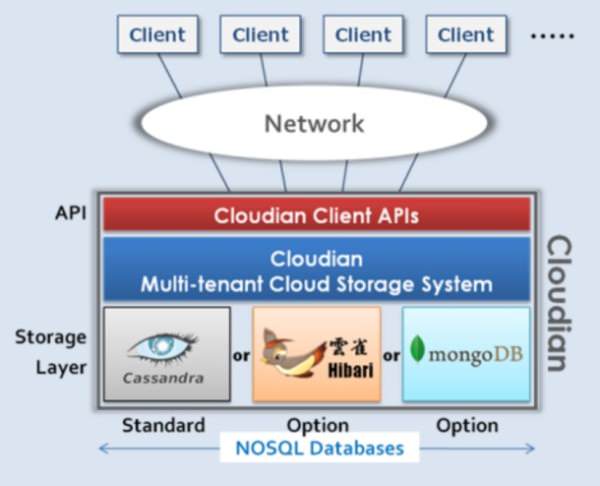Last March, a new company called Gemini Mobile Technologies initiated an innovative, cloud-hosted database platform service, where objects are stored in Gemini’s cloud and customers pay only for the space consumed. That service is now called Cloudian; and earlier this week, Gemini took the second step toward achieving competitive par with big names like Oracle Database Cloud Service.

Thanks to a new partnership between Gemini and the community supporting OpenStack, the open source cloud operating system, developers building applications for OpenStack can utilize the existing API for Amazon S3, the cloud storage access platform, to connect those applications with Cloudian multi-tenant NoSQL databases.

Cloudian is not really the database provider or the database format, but rather, a system for enabling accessibility to NoSQL databases through the S3 API. As this basic diagram shows, it utilizes a variety of NoSQL back-end object storage layers, including Cassandra. Gemini’s plan is to add OpenStack’s Swift back-end store in the coming months.
With Gemini’s entry into the picture, the cloud database landscape now looks like this: OpenStack users currently utilize the Swift layer to set up server clusters on-premise. These clusters are then easily scalable using readily available storage. Current implementations of Swift emulate the S3 API. This allows you to store data objects from very small to very large in Amazon-style “buckets,” although it’s not really the same as storing those objects to the real S3. A handful of providers are working on middleware layers, SMEStorage being one of them. Those layers enable something on the order of S3 storage compatibility.
Once Swift is fully incorporated into Cloudian’s sphere of operations, you’ll be able to use OpenStack to scale how much data is stored on-premise, with the remainder in the S3 public cloud. You may then provide S3-compatible storage services yourself as a public or dedicated cloud provider, and your customers’ data may be divided among on-premise and S3 storage as necessary.
Most importantly, any customer with an application designed to deploy over S3 already, can deploy to your S3-compatible Cloudian cluster instead.
“New node detection and data re-balancing is performed automatically without service interruption,” reads the Cloudian data sheet (PDF available here). “Cloudian is resilient to network and node failures with no data loss due to the automatic replication and recovery processes inherent to the architecture. The system can be deployed across multiple sites and datacenters to provide geo-redundancy. Upgrades and updates can be performed without service interruption.”

















